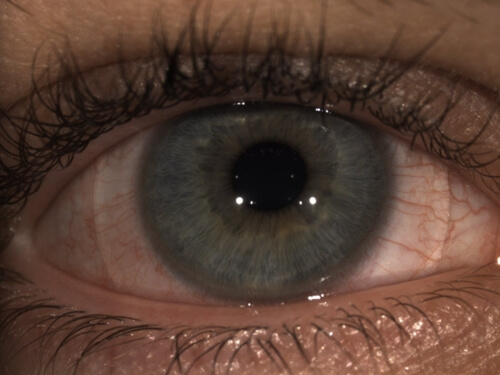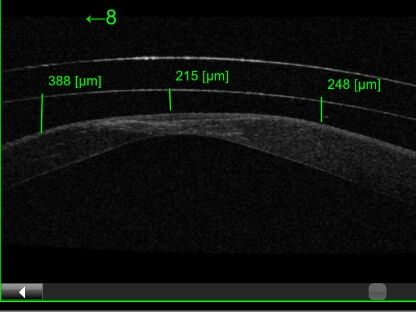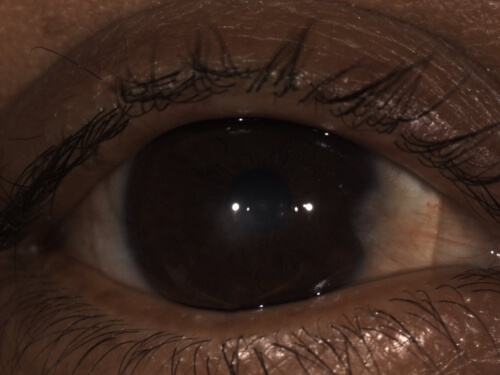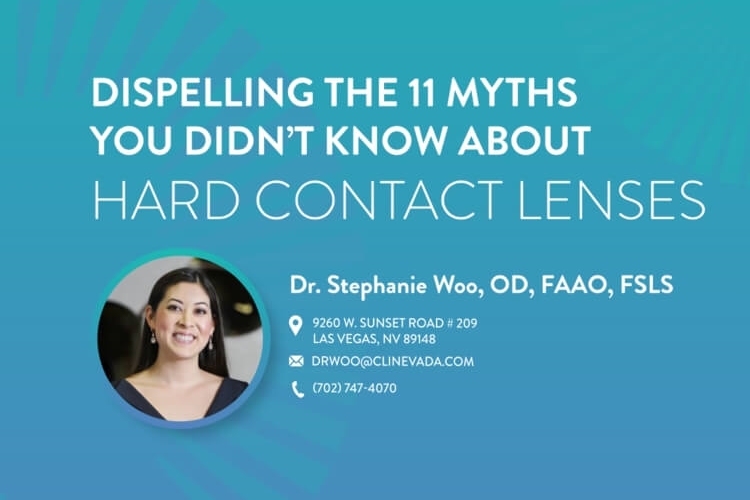What is Keratoconus?
Learn from Dr. Stephanie Woo what keratoconus is and available treatment options.
The Contact Lens Institute of Nevada is entirely dedicated to the needs of specialty contact lens patients.
Causes of Keratoconus
While we don’t know why people develop keratoconus, it is associated with allergies, excessive rubbing, and various disorders like Marfan syndrome and Ehlers-Danlos syndrome. In about 10% of cases, it appears to be genetic. Early onset can happen as young as ten years old, however, it is most commonly found in teens and people in their early 20s. The condition usually progresses over decades, but can also worsen quickly. Newer equipment options have given doctors the ability to diagnose keratoconus faster than ever before.
Keratoconus Treatments
Corneal cross linking and Intacs are surgical options for some keratoconus patients to help slow down the progression of the disease. Almost all keratoconus patients will require specialty contact lenses to improve their vision, even if they’ve had surgery. Innovative options such as gas permeable, hybrid, and scleral lenses can provide a drastic visual improvement. In late-stage keratoconus, or those with scar tissue, you may need a corneal transplant. After a transplant, a specialty contact lens may improve your vision.
Specialty Contact Lenses
Most keratoconus patients require specialty contact lenses to improve their vision. Regular glasses and soft contact lenses usually do not provide clear vision, due to the shape of the eye that comes with keratoconus. Luckily, custom contact lenses provide an excellent option for keratoconus patients. These specially designed lenses can re-direct the image to focus properly within they eye, yielding a tremendous improvement in vision. Options include custom soft lenses, hybrid lenses, gas permeable lenses, and scleral lenses.
What Are Keratoconus Symptoms?
When your cornea distorts into a cone shape, it can cause a number of symptoms in the form of distorted vision and eye discomfort. The most common complaints are:
- Blurry vision
- Shadowy or double vision
- Fluctuating vision
- Vision distortions like straight lines that look wavy or that bend
- Light sensitivity
- Glare
- Difficulties with night vision
- Swollen, red, uncomfortable eyes
In many cases, the condition affects each eye differently. Keratoconus is a progressive disease, meaning that it will worsen over time. The shape of the eye will continue to change, unless action is taken (such as corneal cross linking). If you are diagnosed with keratoconus at a young age, cross linking is recommended to slow down the progression of keratoconus. Because the eye naturally becomes harder/stiffer over time, older patients may not need this type of surgical intervention Your eye doctor is the best person to help you make the best decision for your unique situation.
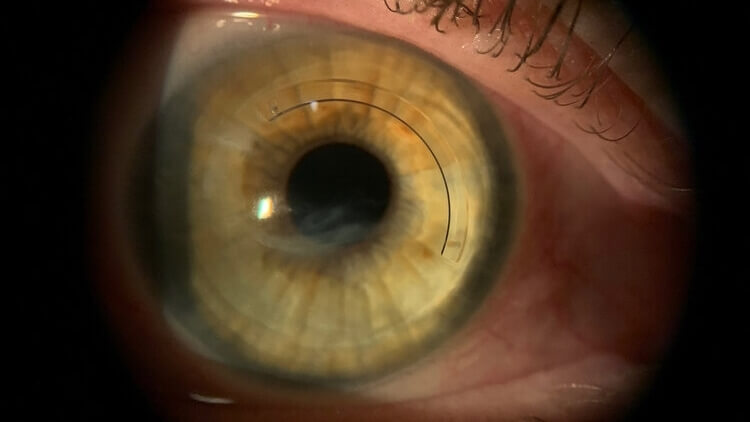
Scleral Contact Lenses
Many keratoconus patients find major success with scleral contact lenses. Scleral contact lenses have given doctors the ability to fit even the most complicated keratoconus cases. Since the lens does not balance on the cornea, they do not dislodge like corneal gas permeable lenses. Scleral lenses use the white part of the eye (called the sclera) to rest on, so the comfort of the lenses are very good. Scleral lenses are made of hyper gas permeable material, which allows oxygen into your eye. This material helps to re-direct the light that comes into your eye, resulting in a much clearer image. Many keratoconus patients find scleral lenses to be comfortable and provide excellent vision.
What is Keratoconus?
The cornea is the clear outer layer of the front of your eye. Normally round and shaped like a dome, the cornea is the window that lets in light and focuses it on your retina (back surface of your eye). Keratoconus causes the cornea to become thin and it creates a steeper shape compared to a normal cornea. When the corneal surface thins, it can bulge out in an irregular cone shape—a condition diagnosed as keratoconus. Because the shape of the front surface of the eye is now irregular, it cannot focus light properly to the back of the eye. This results in a blurry, distorted vision. Luckily, specialty contact lenses can help re-focus the light. This results in a large improvement in visual quality. Specialty contact lenses are required for most keratoconus patients to see their best.
Why Contact Lens Institute of Nevada for Keratoconus Treatments?
We are highly proficient in specialty contact lenses. Keratoconus patients make up more than 70% of our entire patient base. We have created customized contact lens solutions for thousands of patients. There is truly no substitute for experience. Our innovative contact lens technologies for treating keratoconus give you vision improvement unattainable with conventional methods. Our doctors are opinion leaders within the field of specialty contact lenses and treating keratoconus. Leading specialty contact lens manufacturers work closely with us in developing advanced emerging technologies. We know eye care isn’t just about technology, but is about you as a person. Expect one-on-one attention with the doctor at every single visit. We are committed to giving you the highest level of service to create an unparalleled patient experience.
Check out some of recent keratoconus patient success stories!
Frequently asked questions about keratoconus
Will I go blind from keratoconus? New technology has allowed doctors to diagnose keratoconus more effectively than ever before. The reason most patients who go blind from keratoconus is due to complications associated with the severe or advanced state of the disease. With the invention of surgeries such as corneal crosslinking, along with equipment dedicated to diagnosing keratoconus, we expect less patients to go blind. This is due to proper management of the keratoconus patient and early intervention. Find a doctor who is an expert in this disease.
Why do I have keratoconus? We still aren’t sure why keratoconus happens, but we do know that genetics and environment play a role. Eye rubbing is heavily associated with keratoconus patients. If you rub your eyes – STOP! This is one of the main risk factors for keratoconus.
How do I stop rubbing my eyes? Ask you eye doctor for custom recommendations based on your unique eyes. Place artificial tears or vials of preservative free saline into the refrigerator. When you feel your eyes starting to itch, place a drop into your eye. The cooling sensation of the eye drop often times alleviates the itchy feeling. Over the counter allergy eye drops such as Zaditor, Naphcon A, and Patanol can also help. Prescription strength allergy drops like Lastacaft or Pataday can also be useful.
Does keratoconus worsen over time? Yes, keratoconus is a progressive disease, meaning it gets worse and worse.
Are there treatment options to help keratoconus? Yes, corneal crosslinking is an FDA approved surgical option indicated to slow the progression of keratoconus. Early intervention is key. The faster you can get the surgery, the faster you can slow it down or stop the progression. There are other surgical options such as Intacs, which are small plastic segments inserted into the cornea, however crosslinking has become the preferred keratoconus treatment for most eye doctors.
Will I need to get crosslinking again? Hopefully not. Most patients will only need crosslinking once in their lifetime.
How do I know which type of corneal crosslinking to choose? There are 2 corneal crosslinking options, epi-on and epi-off. There are pros and cons to each. It is too difficult to make a strong argument for one over the other. The surgeon will review your age, keratoconus condition, overall health, financial situation, currently medicines, lifestyle, and more. All of these will play a role in deciding which option is best for you. Find a corneal surgeon who is an expert in corneal crosslinking and have them help you decide.
Why can’t I just wear glasses? Keratoconus causes the front surface of your eye to steepen, which results in an irregular shape. When an image comes into the eye, it is distorted by this irregular shape. The end result is a blurry image. Glasses cannot help this type of irregular prescription, called irregular astigmatism. Specialty contact lenses are usually the best option to improve the vision of keratoconus patients.
Can I get LASIK or some other type of surgery to improve my vision? Unfortunately, no. Refractive surgery such as LASIK is not an option for any patients with keratoconus. In fact, if you get LASIK surgery and you have keratoconus, you could end up with even worse vision!
Will I pass this down to my kids? It’s possible. Because keratoconus has a genetic component, your children should be screened at regular intervals. If your kids rub their eyes excessively, they will be at even higher risk.
Do my cousins or siblings have keratoconus? Possibly. If you are diagnosed with keratoconus, inform your family members so they can all get screened for keratoconus. In many cases, you might be the only one in the whole family with the condition.
Is it better to get fit for specialty contact lenses before or after crosslinking surgery? If finances allow, get crosslinking first. Then, about 30 days or more later, your eye doctor can fit you into specialty contact lenses. Since the shape of your eye will be more stable after the surgery, the contact lens fitting may be more accurate. If you have to choose one over the other, it will depend on a variety of factors. How old are you? How advanced is your keratoconus? What is your current vision like now? For some of our patients, they cannot afford both crosslinking and specialty lenses. We help them decide which is the right option for them.
What kind of contact lenses do I need to improve my vision if I have keratoconus? Traditional soft contact lenses will not help to improve your vision, in most cases. More custom options such as custom soft lenses for keratoconus, corneal gas permeable lenses, hybrid lenses, or scleral lenses are usually the best contact lens options. Find an eye doctor who is an expert in fitting keratoconus patients. They will be able to evaluate your eye condition and your lifestyle to make appropriate recommendations.

